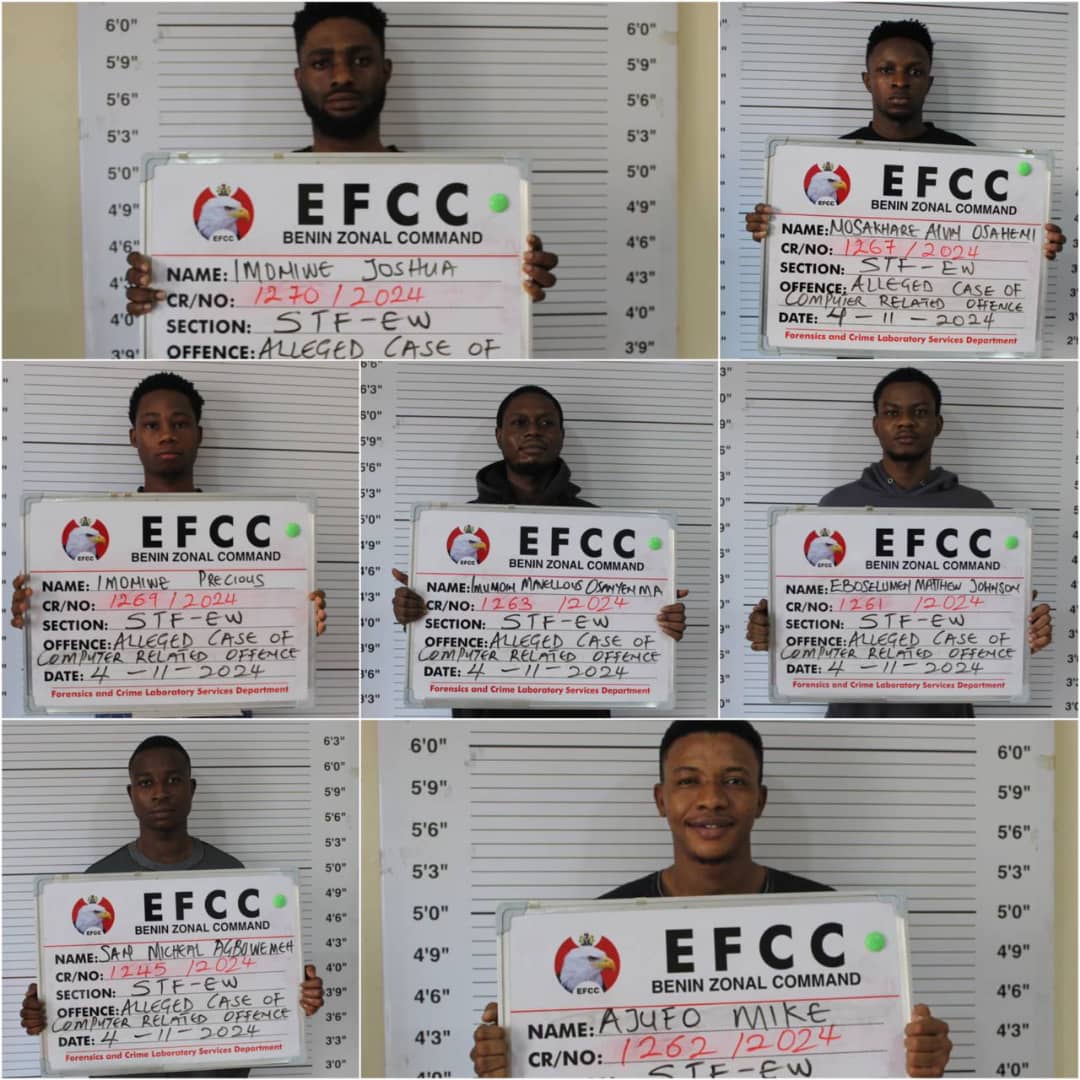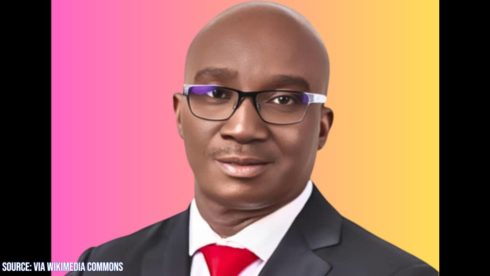The Economic and Financial Crimes Commission (EFCC) secured the conviction of seven internet fraudsters in Benin City, Edo State, between November 6 and 7, 2024. The convicts, including Johnson Matthew Ebosa, Marvelous Osayenma, Imoniwe Joshua, Michael Agbowemeh San, Alvin Nosakhare Osareni, Precious Imoniwe, and Mike Ajufo, were sentenced by Justice A.N. Erhabor of the Edo State High Court for various cyber-related offenses. The successful prosecution underscores the EFCC’s commitment to tackling internet fraud, a growing issue affecting both Nigeria’s economy and its global image.
The fraudsters faced charges that ranged from obtaining by false pretenses to the possession of fraudulent documents. All seven individuals pleaded guilty, leading the prosecution team, represented by F.A. Jirbo, K.Y. Bello, and Isa K. Agwai, to request their sentencing. This case is part of a larger effort by the EFCC’s Benin Zonal Directorate to combat cybercrime, which has become prevalent in Edo State and across Nigeria. The convictions are anticipated to serve as a deterrent to other would-be cybercriminals.
Details of Charges and Court Proceedings
The defendants were each tried on separate one-count charges. For instance, Johnson Matthew Ebosa was accused of possessing documents containing false pretenses, an act that contravenes Sections 6 and 8(b) of the Advance Fee Fraud and Other Fraud Related Offences Act 2006. His charge stated that he “ought to have known” the fraudulent nature of the documents in his possession. Similarly, other defendants were found guilty of retaining proceeds from fraudulent activities and possessing fake documents, central elements in most cyber fraud cases.
When the charges were read out, all defendants pleaded guilty, signaling their acknowledgment of their criminal acts. Their defense counsel appealed to Justice Erhabor to temper justice with mercy, citing the defendants’ remorse and apparent desire to reform. This plea for leniency was met with a measured response from the court, which took into account both the defendants’ acknowledgment of guilt and the serious nature of their offenses.
Sentencing and Fines Imposed by the Court
Justice Erhabor delivered his verdict over two days, handing down sentences that ranged from two to three years of imprisonment. Notably, Michael Agbowemeh San and Alvin Nosakhare Osareni were sentenced to two years each or an optional fine of N200,000. Johnson Matthew Ebosa, Marvelous Osayenma, and Imoniwe Joshua received three-year sentences or a fine of N200,000 each. The court extended similar sentencing conditions to Precious Imoniwe and Mike Ajufo, who received three and two-year terms, respectively, also with the option of paying a fine.
The court’s imposition of fines as an alternative to jail time reflects a nuanced approach to sentencing in fraud cases, where restitution and deterrence are both prioritized. The EFCC’s legal representatives emphasized that these punishments should act as a deterrent for other potential fraudsters while also encouraging the convicted individuals to reform their ways. The court’s leniency, allowing a fine in place of incarceration, may also aim to reduce the strain on correctional facilities.
Seizure of Assets and Future Conduct Agreements
In addition to their sentences, the convicted fraudsters were ordered to forfeit all assets related to their criminal activities, including mobile phones, laptops, and funds in their bank accounts. These forfeited items were deemed to be proceeds from their fraudulent dealings, thus reinforcing the legal stance that ill-gotten gains are subject to recovery by the state. The confiscated items will be handed over to the Federal Government of Nigeria, signifying a commitment to reclaiming resources obtained through criminal activities.
Further, the convicts were mandated to sign undertakings promising to be of good behavior going forward. This stipulation is intended to promote accountability and discourage recidivism, encouraging the convicts to rebuild their lives within the bounds of the law. The EFCC hopes that these actions will help deter other individuals from engaging in internet fraud, thereby contributing to a safer digital environment in Nigeria.
EFCC’s Continued Efforts to Combat Cybercrime
The arrests of these seven individuals were the result of a carefully coordinated operation by the Benin Zonal Directorate of the EFCC, targeting individuals involved in fraudulent online schemes. This case is part of a larger strategy by the commission to address cybercrime, which has risen sharply in recent years. As technology evolves, the EFCC has also adapted its methods, employing advanced tactics to identify and apprehend cybercriminals across Nigeria.
Through these convictions, the EFCC reaffirms its commitment to fighting internet fraud and ensuring that perpetrators face justice. As cybercrime remains a pressing challenge for Nigeria, the agency continues to emphasize the importance of legal action, public awareness, and international collaboration in mitigating its effects. The EFCC’s success in this case highlights the ongoing battle against cybercriminals and the need for constant vigilance in the face of evolving threats.
Table of Contents
Discover more from OGM News NG
Subscribe to get the latest posts sent to your email.














